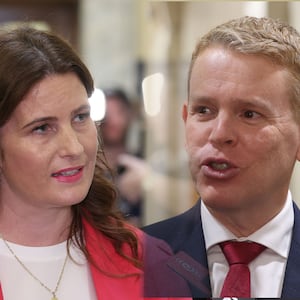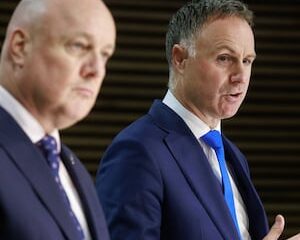Politics
Finance Minister Challenges Opposition Over New Zealand’s Fiscal Policies

Finance Minister Nicola Willis launched a pointed critique of the opposition’s fiscal policies during a session in the New Zealand Parliament on March 5, 2024. She specifically targeted Labour leader Chris Hipkins and Green Party co-leader Chlöe Swarbrick, accusing them of what she described as “fiscal vandalism.” This confrontation arose as Willis celebrated the Government’s ability to maintain its AA+ credit rating, as affirmed by the rating agency Fitch, despite ongoing pressures on public finances.
In a press release issued earlier that day, Willis highlighted the significance of the credit rating, noting that it reflects New Zealand’s historical reputation for responsible fiscal management. She stated, “Historically, New Zealand governments have been able to borrow at reasonable rates because of their reputation for being responsible managers of public money, but that is not something that should be taken for granted.”
Willis referred to Fitch’s commentary, which cautioned that any signs of weakening commitment to fiscal responsibility could jeopardize the country’s creditworthiness. “Fitch warns that ‘evidence of a weakening in the culture of fiscal commitment to fiscal responsibility would affect creditworthiness,’” she remarked, framing this statement as a direct critique of the current opposition’s approach to fiscal governance.
The debate over fiscal responsibility is particularly pertinent as New Zealand navigates a challenging economic landscape. Rising costs of living and inflation have placed added pressure on government budgets, prompting discussions about spending priorities and economic strategies. The Government’s commitment to upholding its credit rating is crucial for maintaining investor confidence and ensuring access to capital at favorable rates.
In response, Chris Hipkins defended the Labour Party’s record, arguing that the previous administration had laid the groundwork for a resilient economy. He emphasized the importance of balancing fiscal responsibility with the need to invest in essential public services.
Chlöe Swarbrick, representing the Green Party, echoed these sentiments, highlighting the necessity of sustainable spending practices that prioritize environmental and social well-being. The exchange between these political figures underscores a broader debate in New Zealand about the balance between fiscal prudence and the need for progressive investments in public infrastructure and social programs.
As the Parliament session continues, the discourse surrounding fiscal responsibility is expected to intensify, with both sides putting forward their visions for New Zealand’s economic future. The implications of these discussions will likely resonate beyond the political arena, influencing public sentiment and potentially shaping upcoming electoral outcomes.
Willis’s remarks and the subsequent rebuttals from Hipkins and Swarbrick encapsulate the ongoing struggle for control over New Zealand’s fiscal narrative. With the credit rating at stake, the stakes are high as the Government and opposition grapple with defining what fiscal responsibility truly entails in today’s economic climate.
-

 World1 week ago
World1 week agoPrivate Funeral Held for Dean Field and His Three Children
-

 Top Stories2 weeks ago
Top Stories2 weeks agoFuneral Planned for Field Siblings After Tragic House Fire
-

 Sports3 months ago
Sports3 months agoNetball New Zealand Stands Down Dame Noeline Taurua for Series
-

 Entertainment3 months ago
Entertainment3 months agoTributes Pour In for Lachlan Rofe, Reality Star, Dead at 47
-

 Entertainment2 months ago
Entertainment2 months agoNew ‘Maverick’ Chaser Joins Beat the Chasers Season Finale
-

 Sports3 months ago
Sports3 months agoSilver Ferns Legend Laura Langman Criticizes Team’s Attitude
-

 Sports1 month ago
Sports1 month agoEli Katoa Rushed to Hospital After Sideline Incident During Match
-

 World2 weeks ago
World2 weeks agoInvestigation Underway in Tragic Sanson House Fire Involving Family
-

 Politics2 months ago
Politics2 months agoNetball NZ Calls for Respect Amid Dame Taurua’s Standoff
-

 Top Stories2 weeks ago
Top Stories2 weeks agoShock and Grief Follow Tragic Family Deaths in New Zealand
-

 Entertainment3 months ago
Entertainment3 months agoKhloe Kardashian Embraces Innovative Stem Cell Therapy in Mexico
-

 World4 months ago
World4 months agoPolice Arrest Multiple Individuals During Funeral for Zain Taikato-Fox





















